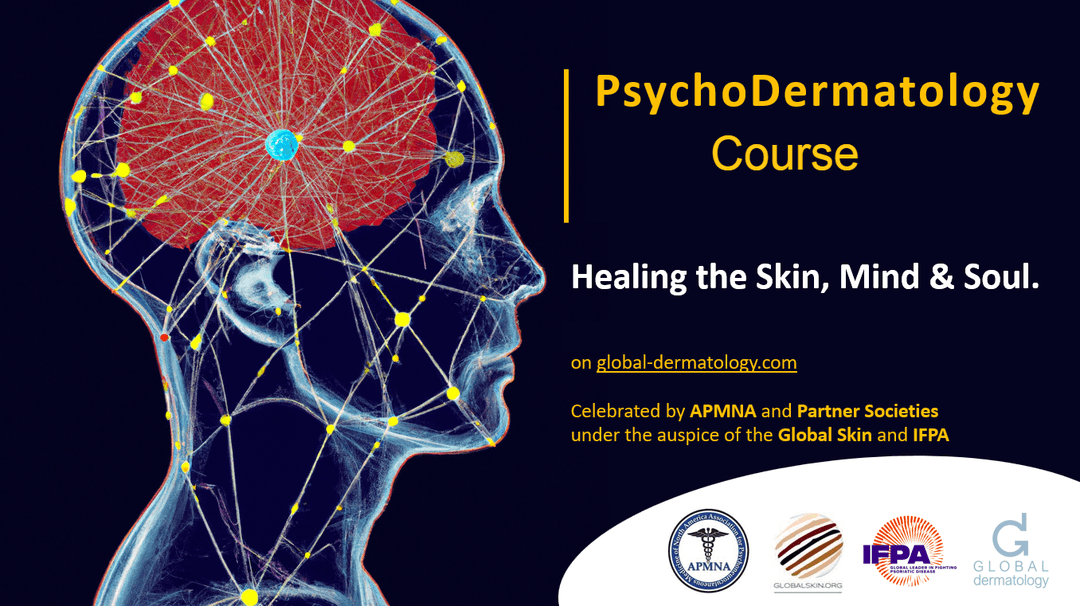
Psychodermatology
4h40
5 modules
23 lectures
Accreditation
Psychodermatology
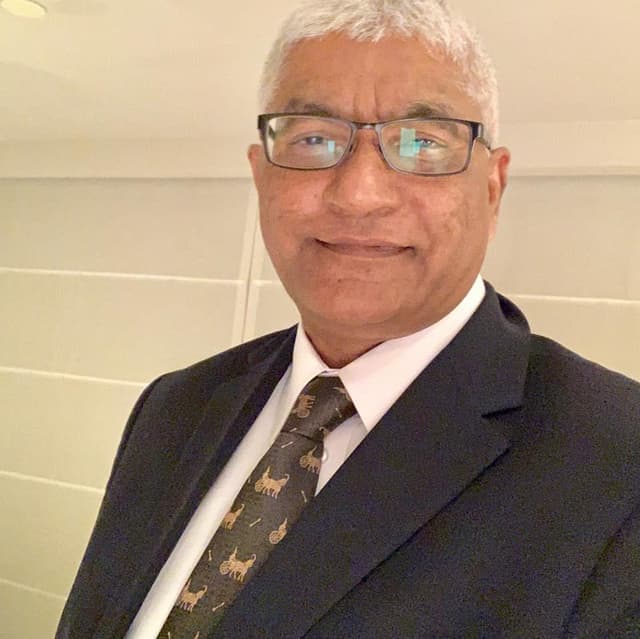
Chair:Prof Mohammad Jafferany, MD

Psychodermatology
4h40
5 modules
23 lectures
Accreditation
Psychiatric Diseases in Dermatology

Psychiatric Diseases in Dermatology
Mohammad Jafferany MD
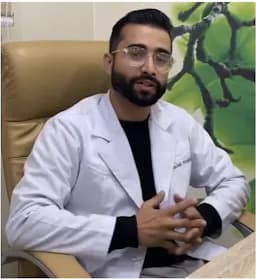
Holistic Treatment Approach in Management of Skin Diseases: How often do we incorporate Psychological aspect of Skin diseases?
Prajwal Pudasaini MD
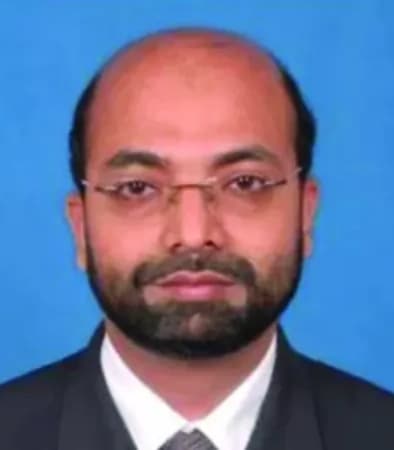
Factitious Dermatoses (FD) treated with hypnotherapy
Abdul Latheef MD

Bipolar Disorder and Skin
Estela Malatesta MD

Post traumatic stress disorder(PTSD) and the Dermatology patient. A clinical case
Marcia Senra MD

Psychotrichological approach in the management of patients with hair diseases
Yuliya S. Ovcharenko MD, PhD
Mental Health in Chronic Dermatoses

Effect of stress on skin disorders in Children
Shrea Kapoor MD, MBBS

Effect of stress on skin disorders in Children
Shrea Kapoor MD, MBBS
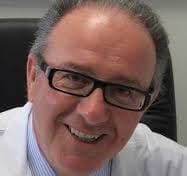
Cytokines - emergent role in the psychocutaneous disorders
Lotti Torello MD

Psychodermatology: Focus on the Possible Role of Eye Movement Desensitization and Reprocessing (EMDR) in Clinical Cases
Antonio C. Sison MD

Psychosocial Burden of hidradenitis suppurativa
İlknur K. Altunay MD

Patient-Reported Impact of Dermatological Diseases (PRIDD) Measure: Quantifying psychological and social impact
Allison Fitzgerald MD
Psychodermatology in Cosmetic Dermatology

Beauty and the Beast: Stress, Trauma, Skin Disease and an Embodied Approach To Healing
Keira L. BARR MD
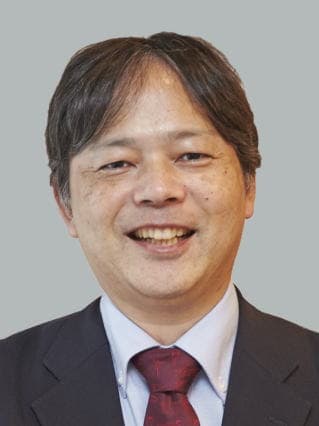
Psychosomatic approach to a case with hyperhidrosis
Makoto Hashiro MD

Approaching psychosocial impact of Alopecia Areata on Patient
Ruta Barkauskaite MD

Alopecia Areata: it is not just hair
Maria-Angeliki Gkini MD. Msc. PhD, FRCP
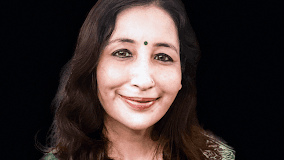
Acne, its relevance and role in Psychocutaneous Dermatology Practice
Arora Gulhima
Management of Dermatological Delusional Disorders

Psychodermatology and Dermatological Delusional Disorder Diagnosis
John Koo MD

Treatment and Management of Delusional disorders
John Koo MD
Introduction - Delusional Disorders
Peter Khoury Dr
Body dysmorphic disorder and zoom dysmorphia
Introduction - Body dysmorphic disorder
Peter Khoury Dr
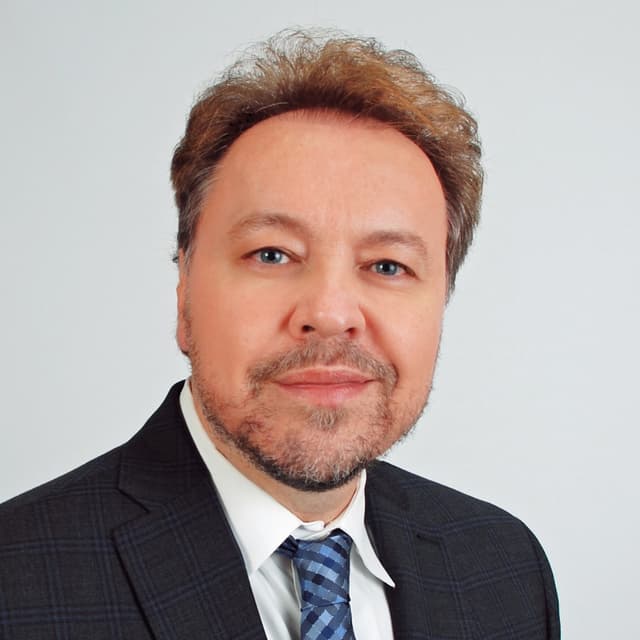
body dysmorphic - part 1
Georges Kroumpouzos MD, PhD

body dysmorphic - part 2
Georges Kroumpouzos MD, PhD
Learning objectives
Overview
This innovative course delves into the intricate relationship between dermatological conditions and psychological health, providing clinicians with essential skills to address psychodermatological disorders effectively. Participants will explore the diagnosis and treatment of dermatological delusional disorders, understand psychiatric comorbidities in dermatology patients, develop strategies to support mental health in chronic skin conditions, recognize psychological aspects of cosmetic dermatology, and master screening techniques for body dysmorphic disorders including contemporary concerns like Zoom dysmorphia.
The curriculum emphasizes a holistic approach to patient care, combining dermatological expertise with psychological insight. Learners will gain proficiency in managing conditions where skin and mental health intersect, from delusional parasitosis to the psychological impact of chronic eczema and psoriasis. Special attention is given to identifying red flags in cosmetic patients and implementing appropriate screening tools for body image concerns.
Key Learning Outcomes:
Participants will develop the ability to diagnose and manage complex psychodermatological cases through multidisciplinary approaches, recognize and address psychiatric components of skin diseases, implement mental health support for chronic dermatosis patients, navigate ethical considerations in cosmetic dermatology, and utilize validated diagnostic tools for body dysmorphic disorders in both clinical and digital contexts.
Course Content:
The program covers five core areas: understanding and treating dermatological delusional disorders; recognizing psychiatric conditions in dermatology practice; addressing mental health challenges in chronic skin diseases; psychological aspects of cosmetic dermatology; and identification and management of body dysmorphic disorder with particular focus on emerging digital manifestations.
Target Professionals: Dermatologists, psychiatrists, primary care physicians, psychologists, and mental health practitioners seeking to enhance their psychodermatology expertise.
Instructional Approach: The course combines expert lectures with real-world case studies and Evaluation of knowledge..
Professional Impact: Graduates will emerge with enhanced skills to provide comprehensive, patient-centered care that addresses both the dermatological and psychological dimensions of skin disorders.
Might interest you

PsychodermatologyDermoscopyNeglected Tropical Disease
Cutaneous Medicine: Multidisciplinary Approaches in Dermatology
Chair: Prof. Fahafahantsoa Rapelanoro Rabenja,
This course explores the intersection of dermatology with other medical specialties, emphasizing a collaborative approach to diagnosing and managing complex skin disorders. It covers a wide range of topics, including dermatopathology, rheumatology, oncology, and infectious diseases, highlighting how systemic conditions manifest cutaneously. With contributions from experts in various fields, the text provides comprehensive insights into multidisciplinary care, advanced diagnostic techniques, and innovative treatments. Ideal for dermatologists, internists, and specialists, it bridges gaps between disciplines to improve patient outcomes in cutaneous medicine.

Psychodermatology
Psychodermatology
Chair: Prof Mohammad Jafferany, MD
This specialized course explores the vital intersection between dermatology and mental health, equipping clinicians with the knowledge and tools to manage psychodermatological conditions effectively. Through a blend of theoretical knowledge and practical application, participants will learn to diagnose and treat dermatological delusional disorders, identify psychiatric comorbidities in skin disease patients, and implement mental health strategies for chronic dermatoses. The curriculum also examines psychological factors in cosmetic dermatology and provides cutting-edge screening techniques for body dysmorphic disorder, including modern digital manifestations like Zoom dysmorphia. Adopting a patient-centered approach, the course emphasizes multidisciplinary management of conditions where psychological and dermatological factors interact. Participants will gain expertise in recognizing psychiatric components of skin diseases, addressing the emotional
burden of chronic conditions, and applying ethical principles in cosmetic practice. The training combines expert instruction with case-based learning to bridge theory and clinical practice. Designed for dermatologists, psychiatrists, psychologists, and primary care providers, this program enhances clinicians' ability to deliver holistic care that addresses both the visible and invisible aspects of skin disorders. Upon completion, practitioners will be better prepared to manage complex psychodermatological cases while improving patient outcomes through integrated mind-skin healthcare.

Pigmentation
Pigmentation
Chair: Dr Seemal Desai, MD, FAAD
Hyperpigmentation is excess skin color from melanin. Understand melanin synthesis mechanisms and main causes.

Neglected Tropical Disease
Neglected Tropical Skin Diseases
Chair: Dr. Prajwal Pudasaini, MD
Neglected tropical skin diseases affect poor populations in tropical areas. They include leprosy, mycetoma, and cutaneous leishmaniasis, causing disability and stigma. They receive little attention and resources, leading to poor diagnosis and treatment. Increased awareness and improved healthcare access are needed to help affected communities.
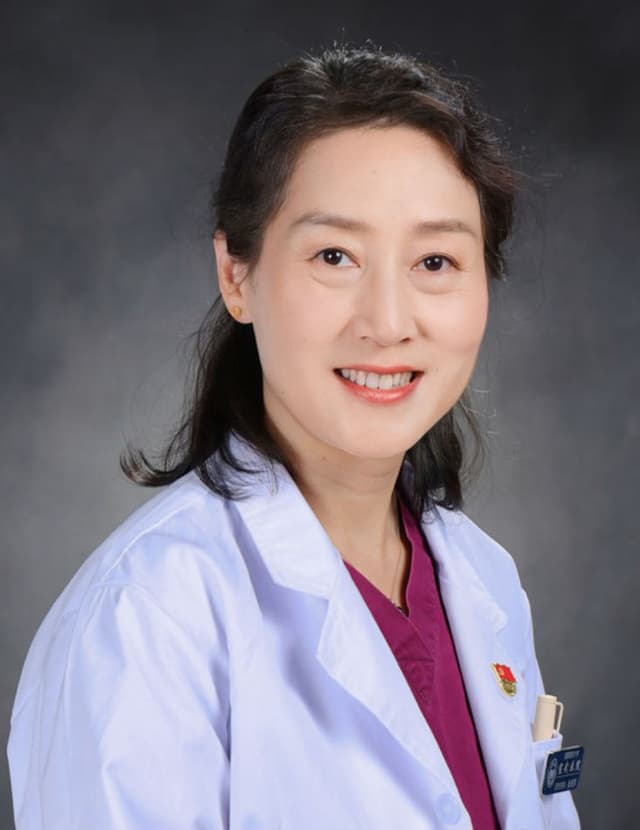
TCM Chinese Medicine
Acne Treatment in China
Chair: Prof. Haiping Zhang, PhD
Acne treatment in China combines traditional methods with modern practices.
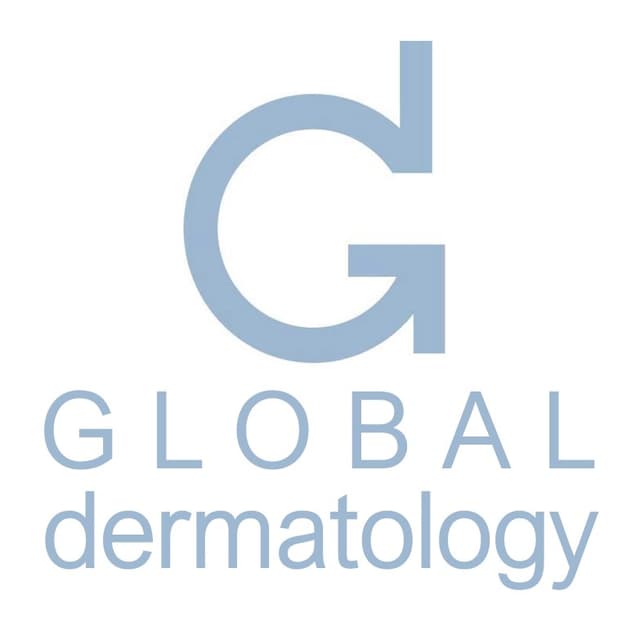
Pigmentation
Cyspera Medical Education
Chair: Global Dermatology,
Cyspera® is a topical pigment-correcting treatment formulated with cysteamine, a naturally occurring compound that reduces the appearance of persistent hyperpigmentation, including melasma, post-inflammatory hyperpigmentation, and lentigines. It is known for being non-hydroquinone, suitable for long-term use, and effective on all skin types.

Topographic Dermoscopy
Chair: Prof. Awatef Kelati, MD
Topographic dermoscopy refers to the region-specific application of dermoscopic examination, emphasizing the unique morphological patterns found across different anatomical sites. On facial skin, the dermoscopic assessment requires recognizing patterns influenced by the high density of pilosebaceous units and sun-induced changes, often presenting pseudonetworks and annular-granular structures. The ear, with its thin skin and sebaceous gland concentration, reveals specific vascular and follicular clues important in distinguishing benign from malignant lesions.
On the chest and back, where the skin is thicker and sun exposure varies, dermoscopy must account for irregular pigment distribution and architectural disorder, especially in large nevi or early melanomas. Limb lesions may show distinctive features due to mechanical friction, hair density, and vascular variations, demanding precise interpretation to identify atypical nevi or skin cancers.
Palmar and plantar dermoscopy highlights the parallel ridge pattern critical for melanoma diagnosis, contrasting with benign acral patterns like the parallel furrow or lattice-like structures. Scalp and hair disorders benefit from trichoscopy, where dermoscopic evaluation reveals specific signs such as yellow dots, broken hairs, or black dots, aiding in the diagnosis of alopecia areata, androgenetic alopecia, or tinea capitis.
In nail disorders, onychoscopy enables visualization of melanonychia, hemorrhages, and nail matrix changes, crucial for distinguishing subungual melanoma from benign causes like trauma or fungal infection. Mucosal dermoscopy, though technically challenging, provides diagnostic clues in pigmented lesions of the lips, genitalia, or oral mucosa, requiring adaptation to moist, non-keratinized surfaces.
Finally, ultraviolet dermoscopy reveals a unique application: scabies mites fluorescing bright green under UV light, enhancing detection when traditional visualization fails. Topographic dermoscopy thus demands both anatomical knowledge and technical adaptation to maximize diagnostic accuracy across diverse body sites.
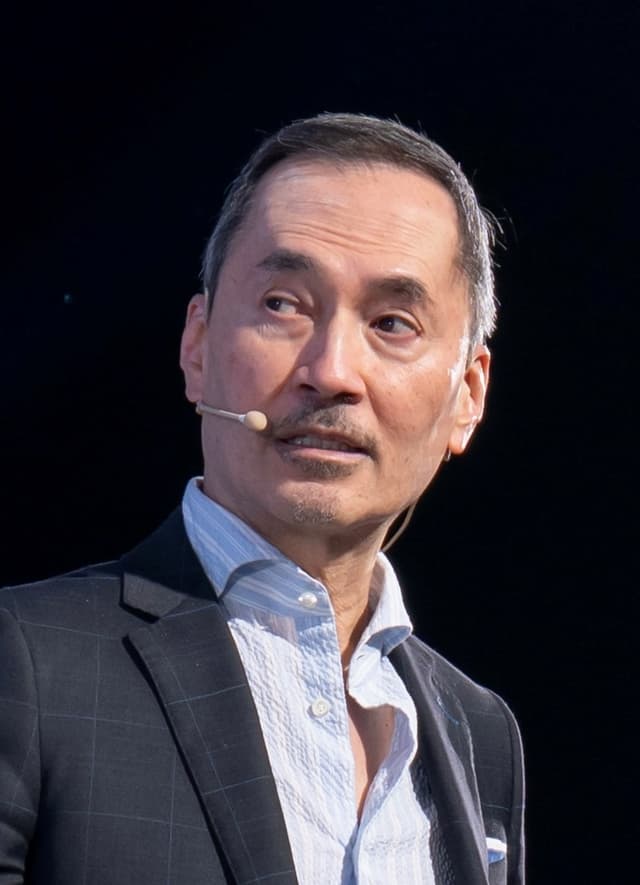
Acne
ACNE
Chair: Dr. Jerry Tan, MD
The ACNE | Education Series, led by Dr. Jerry Tan, is a comprehensive global medical education initiative designed to enhance the understanding and skills of dermatologists and healthcare practitioners regarding acne. Participants will gain insights from leading international experts on the latest advancements in acne research, innovative treatment options, and patient-centered care approaches. The event features interactive discussions, live Q&A sessions, and evidence-based strategies, all at no cost. The esteemed faculty includes specialists from the USA, Italy, France, the UK, Singapore, Greece, Australia, Canada, and Germany. This is a valuable opportunity to improve clinical competencies and stay updated on current acne management practices.
Attendees will acquire up-to-date knowledge on acne pathophysiology, new therapeutic options, and patient-oriented management strategies to optimize clinical outcomes in acne treatment. The session will also provide practical insights through expert-led discussions and evidence-based approaches.

Neglected Tropical Disease
Tropical Dermatology and Neglected Tropical Dermatoses
Chair: Prof. Fahafahantsoa Rapelanoro Rabenja,
Dermatological diseases, particularly neglected tropical diseases (NTDs) with skin manifestations like deep mycosis (chromoblastomycosis, sporotrichosis, mycetoma), scabies, leprosy, lymphatic filariasis, and cutaneous leishmaniasis, pose major challenges for healthcare systems in resource-limited regions of Africa, Asia, and Latin America. These conditions severely affect vulnerable populations, suffering from frequent underdiagnosis and inadequate treatment that exacerbates suffering. Diseases such as atopic dermatitis are also under consideration for inclusion as skin NTDs through collaborative efforts involving ISAD, ASDV, and WHO. Furthermore, albinism, highly prevalent in sub-Saharan Africa, presents significant social challenges including stigmatization and occult beliefs. Despite these complex difficulties, the field is undergoing a historic transformation driven by science and technology, particularly artificial intelligence (AI), which offers tangible tools for improving diagnosis, treatment, and prevention. The participation of global experts facilitates vital knowledge exchange, exploration of innovative solutions, and helps address critical shortages of human and material resources in remote areas.
Learning Objective:
Understand the complex challenges posed by dermatological diseases, especially skin NTDs and conditions like albinism, in resource-limited settings, and recognize the critical role of global collaboration, technological innovation (particularly AI), and expert knowledge exchange in developing solutions to improve diagnosis, treatment, prevention, and resource allocation.

Dermoscopy
Dermoscopy
Chair: Prof Awatef Kelati, MD
This comprehensive dermoscopy course provides dermatologists and healthcare professionals with essential skills in skin lesion evaluation, covering fundamental principles through advanced diagnostic applications across five key areas: global dermoscopy practices, pigmented lesion analysis (including differentiation of benign and malignant patterns), specialized techniques for skin of color, skin cancer detection (melanoma and non-melanoma), and general dermatological conditions (inflammatory, infectious, and hair/nail disorders). Participants will develop proficiency in recognizing diagnostic patterns, adapting techniques for diverse skin types, and applying dermoscopic algorithms, ultimately enhancing their clinical accuracy through a combination of theoretical knowledge and practical case-based learning. The course emphasizes real-world application, addressing both common and challenging scenarios in dermatological practice.
